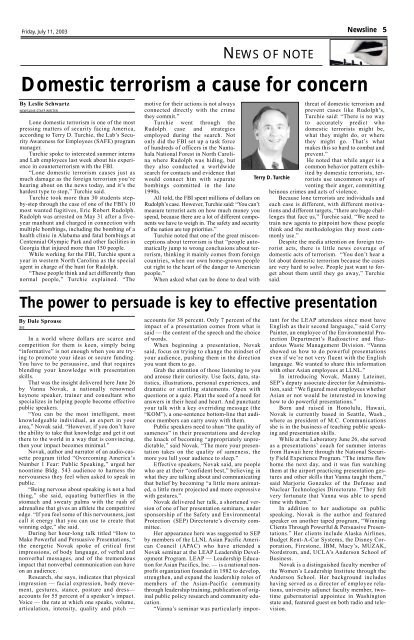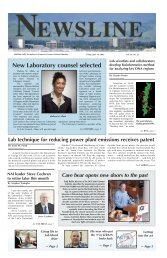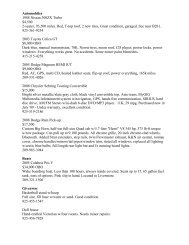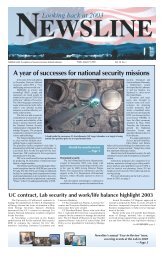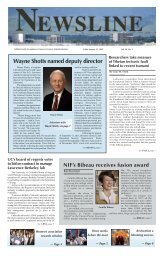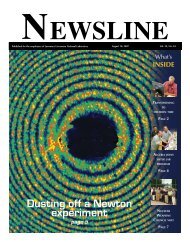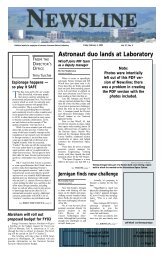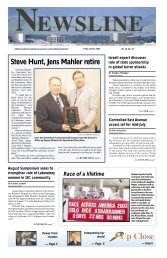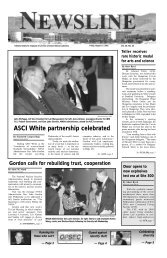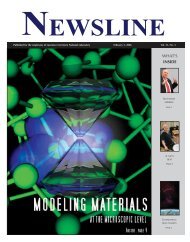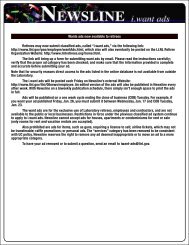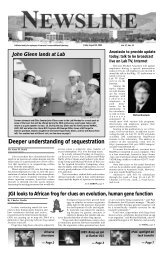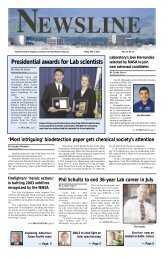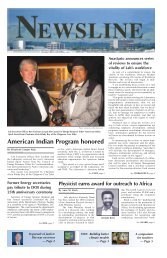Lab earns six R&D 100 Awards - NEWSLINE - Lawrence Livermore ...
Lab earns six R&D 100 Awards - NEWSLINE - Lawrence Livermore ...
Lab earns six R&D 100 Awards - NEWSLINE - Lawrence Livermore ...
You also want an ePaper? Increase the reach of your titles
YUMPU automatically turns print PDFs into web optimized ePapers that Google loves.
Friday, July 11, 2003<br />
NEWS OF NOTE<br />
Newsline 5<br />
Domestic terrorism a cause for concern<br />
By Leslie Schwartz<br />
<strong>NEWSLINE</strong> STAFF WRITER<br />
Lone domestic terrorism is one of the most<br />
pressing matters of security facing America,<br />
according to Terry D. Turchie, the <strong>Lab</strong>’s Security<br />
Awareness for Employees (SAFE) program<br />
manager.<br />
Turchie spoke to interested summer interns<br />
and <strong>Lab</strong> employees last week about his experience<br />
in counterterrorism with the FBI.<br />
“Lone domestic terrorism causes just as<br />
much damage as the foreign terrorism you’re<br />
hearing about on the news today, and it’s the<br />
hardest type to stop,” Turchie said.<br />
Turchie took more than 30 students stepby-step<br />
through the case of one of the FBI’s 10<br />
most wanted fugitives, Eric Robert Rudolph.<br />
Rudolph was arrested on May 31 after a fiveyear<br />
manhunt and charged in connection with<br />
multiple bombings, including the bombing of a<br />
health clinic in Alabama and fatal bombings at<br />
Centennial Olympic Park and other facilities in<br />
Georgia that injured more than 150 people.<br />
While working for the FBI, Turchie spent a<br />
year in western North Carolina as the special<br />
agent in charge of the hunt for Rudolph.<br />
“These people think and act differently than<br />
normal people,” Turchie explained. “The<br />
By Dale Sprouse<br />
IBIS<br />
In a world where dollars are scarce and<br />
competition for them is keen, simply being<br />
“informative” is not enough when you are trying<br />
to promote your ideas or secure funding.<br />
You have to be persuasive, and that requires<br />
blending your knowledge with presentation<br />
skills.<br />
That was the insight delivered here June 26<br />
by Vanna Novak, a nationally renowned<br />
keynote speaker, trainer and consultant who<br />
specializes in helping people become effective<br />
public speakers.<br />
“You can be the most intelligent, most<br />
knowledgeable individual, an expert in your<br />
area,” Novak said. “However, if you don’t have<br />
the ability to take that knowledge and get it out<br />
there to the world in a way that is convincing,<br />
then your impact becomes minimal.”<br />
Novak, author and narrator of an audio-cassette<br />
program titled “Overcoming America’s<br />
Number 1 Fear: Public Speaking,” urged her<br />
noontime Bldg. 543 audience to harness the<br />
nervousness they feel when asked to speak in<br />
public.<br />
“Being nervous about speaking is not a bad<br />
thing,” she said, equating butterflies in the<br />
stomach and sweaty palms with the rush of<br />
adrenaline that gives an athlete the competitive<br />
edge. “If you feel some of this nervousness, just<br />
call it energy that you can use to create that<br />
winning edge,” she said.<br />
During her hour-long talk titled “How to<br />
Make Powerful and Persuasive Presentations, “<br />
the energetic Novak spoke of critical first<br />
impressions, of body language, of verbal and<br />
nonverbal messages, and of the tremendous<br />
impact that nonverbal communication can have<br />
on an audience.<br />
Research, she says, indicates that physical<br />
impression — facial expression, body movement,<br />
gestures, stance, posture and dress—<br />
accounts for 55 percent of a speaker’s impact.<br />
Voice — the rate at which one speaks, volume,<br />
articulation, intensity, quality and pitch —<br />
motive for their actions is not always<br />
threat of domestic terrorism and<br />
connected directly with the crime<br />
prevent cases like Rudolph’s,<br />
they commit.”<br />
Turchie said: “There is no way<br />
Turchie went through the<br />
to accurately predict who<br />
Rudolph case and strategies<br />
domestic terrorists might be,<br />
employed during the search. Not<br />
what they might do, or where<br />
only did the FBI set up a task force<br />
they might go. That’s what<br />
of hundreds of officers in the Nanta-<br />
makes this so hard to combat and<br />
hala National Forest in North Caroli-<br />
prevent.”<br />
na where Rudolph was hiding, but<br />
He noted that while anger is a<br />
they also conducted a worldwide<br />
common behavior pattern exhib-<br />
search for contacts and evidence that<br />
would connect him with separate Terry D. Turchie<br />
ited by domestic terrorists, terrorists<br />
use uncommon ways of<br />
bombings committed in the late<br />
venting their anger, committing<br />
1990s.<br />
heinous crimes and acts of violence.<br />
All told, the FBI spent millions of dollars on Because lone terrorists are individuals and<br />
Rudolph’s case. However, Turchie said: “You can’t each case is different, with different motiva-<br />
measure terrorist acts on how much money you tions and different targets, “there are huge chal-<br />
spend, because there are a lot of different compolenges that face us,” Turchie said. “We need to<br />
nents we have to weigh in. The safety and security train new agents to pinpoint how these people<br />
of the nation are top priorities.”<br />
think and the methodologies they most com-<br />
Turchie noted that one of the great misconmonly use.”<br />
ceptions about terrorism is that “people auto- Despite the media attention on foreign termatically<br />
jump to wrong conclusions about terrorist acts, there is little news coverage of<br />
rorism, thinking it mainly comes from foreign domestic acts of terrorism. “You don’t hear a<br />
countries, when our own home-grown people lot about domestic terrorism because the cases<br />
cut right to the heart of the danger to American are very hard to solve. People just want to for-<br />
people.”<br />
get about them until they go away,” Turchie<br />
When asked what can be done to deal with said.<br />
The power to persuade is key to effective presentation<br />
accounts for 38 percent. Only 7 percent of the<br />
impact of a presentation comes from what is<br />
said — the content of the speech and the choice<br />
of words.<br />
When beginning a presentation, Novak<br />
said, focus on trying to change the mindset of<br />
your audience, pushing them in the direction<br />
you want them to go.<br />
Grab the attention of those listening to you<br />
and arouse their curiosity. Use facts, data, statistics,<br />
illustrations, personal experiences, and<br />
dramatic or startling statements. Open with<br />
questions or a quiz. Plant the seed of a need for<br />
answers in their head and heart. And punctuate<br />
your talk with a key overriding message (the<br />
“KOM”), a one-sentence bottom-line that audience<br />
members can carry away with them.<br />
Public speakers need to shun “the quality of<br />
sameness” in their presentations and develop<br />
the knack of becoming “appropriately unpredictable,”<br />
said Novak. “The more your presentation<br />
takes on the quality of sameness, the<br />
more you lull your audience to sleep.”<br />
Effective speakers, Novak said, are people<br />
who are at their “confident best,” believing in<br />
what they are talking about and communicating<br />
that belief by becoming “a little more animated,<br />
a little more projected and more expressive<br />
with gestures.”<br />
Novak delivered her talk, a shortened version<br />
of one of her presentation seminars, under<br />
sponsorship of the Safety and Environmental<br />
Protection (SEP) Directorate’s diversity committee.<br />
Her appearance here was suggested to SEP<br />
by members of the LLNL Asian Pacific American<br />
Council (APAC) who have attended a<br />
Novak seminar at the LEAP Leadership Development<br />
Program. LEAP — Leadership Education<br />
for Asian Pacifics, Inc. — is a national nonprofit<br />
organization founded in 1982 to develop,<br />
strengthen, and expand the leadership roles of<br />
members of the Asian-Pacific community<br />
through leadership training, publication of original<br />
public policy research and community education.<br />
“Vanna’s seminar was particularly impor-<br />
tant for the LEAP attendees since most have<br />
English as their second language,” said Corry<br />
Painter, an employee of the Environmental Protection<br />
Department’s Radioactive and Hazardous<br />
Waste Management Division. “Vanna<br />
showed us how to do powerful presentations<br />
even if we’re not very fluent with the English<br />
language. We wanted to share this information<br />
with other Asian employees at LLNL.”<br />
In introducing Novak, Manny Lateiner,<br />
SEP’s deputy associate director for Administration,<br />
said: “We figured most employees whether<br />
Asian or not would be interested in knowing<br />
how to do powerful presentations.”<br />
Born and raised in Honolulu, Hawaii,<br />
Novak is currently based in Seattle, Wash.,<br />
where as president of M.C. Communications<br />
she is in the business of teaching public speaking<br />
and presentation skills.<br />
While at the <strong>Lab</strong>oratory June 26, she served<br />
as a presentations’ coach for summer interns<br />
from Hawaii here through the National Security<br />
Field Experience Program. “The interns flew<br />
home the next day, and it was fun watching<br />
them at the airport practicing presentation gestures<br />
and other skills that Vanna taught them,”<br />
said Marjorie Gonzalez of the Defense and<br />
Nuclear Technologies Directorate. “They felt<br />
very fortunate that Vanna was able to spend<br />
time with them.”<br />
In addition to her audiotape on public<br />
speaking, Novak is the author and featured<br />
speaker on another taped program, “Winning<br />
Clients Through Powerful & Persuasive Presentations.”<br />
Her clients include Alaska Airlines,<br />
Budget Rent-A-Car Systems, the Disney Corporation,<br />
Firestone, IBM, Macy’s, MUZAK,<br />
Nordstrom, and, UCLA’s Anderson School of<br />
Business.<br />
Novak is a distinguished faculty member of<br />
the Women’s Leadership Institute through the<br />
Anderson School. Her background includes<br />
having served as a director of employee relations,<br />
university adjunct faculty member, twotime<br />
gubernatorial appointee in Washington<br />
state and, featured guest on both radio and television.


